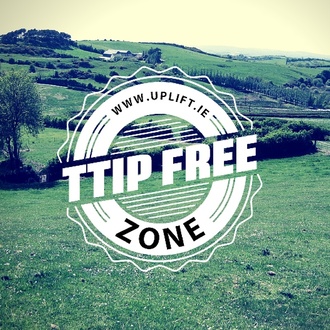- Featured
- Animal Rights
- Anti-racism
- Arts & Culture
- Children
- Climate
- Corporate accountability
- Crime
- Disability rights
- Economic
- Education
- Environment
- Food and Sustainable Production
- Gender Equality
- Governance and Transparency
- Health
- Housing
- LGBT Rights
- Mental health
- Northern Ireland
- Planning
- Privacy and Data Protection
- Rural Inequality
- Social Justice
- Trade
- Transport and Infrastructure
- Workers' Rights
- More
-
We demand our Right2Water Referendum.We want the people's voice to be heard respecting water and sanitation services in Ireland, and a referendum be held. Across the globe ordinary people have undergone tremendous hardship and suffering when water services are privatised. Water is a human right and must never be under the control of 'for profit' companies. Publicly owned, funded and managed water and sanitation services, free at the point of use, is the only way to guarantee access for all.775 of 800 SignaturesCreated by Noreen Murphy
-
Help stop the Bayer- Monsanto mergerIt would be an altogether too powerful body and they would have a complete monopoly on pesticides, fertilizers, seeds etc. Monsanto is a producer of genetically modified crops. A merger between these too would spell disaster for farming and farming produce in Ireland.18 of 100 SignaturesCreated by Rosemary Ryan
-
Justice for Fyffes Workers in Costa Rica and Honduras!Food workers and trade unions in the food export sector of Honduras and Costa Rica continue to be subjected to unsafe working conditions and not having their legal rights fulfilled. The estimated 25,000 people employed in the melon export sector in Honduras, of which 70% are women, regularly work 12-14 hour days, 7 days a week. The International Labour Rights Forum (2012) reports that 85% of workers earn less than the minimum wage [1]. Fyffes has been at the centre of several shocking scandals involving trade union violations and abuse of workers in Honduras and Costa Rica. A report by the US Department of Labor (2015) [2] detailed a litany of exploitative practices, ongoing labour code violations and ill-treatment of workers by the Fyffes subsidiary SurAgro in Honduras, including: That the company failed to pay the minimum wage, the 13th and 14th month bonuses, the seventh day bonus, and overtime; Failed to provide personal protective equipment and potable water; imposed a 300 HNL (US $14.40) penalty for missing a day of work (even with permission from a supervisor) in addition to that day’s salary; Threatened workers with dismissal for speaking with the Honduran Secretariat of Labor and Social Security (STSS) The general union in the United Kingdom, GMB, has called the actions of SurAgro one of the worst cases they have recorded, having documented “a shocking litany of abuse and exploitation on the part of Fyffes subsidiaries in Honduras” [3] and commented that “Fyffes... have no respect for domestic or international law governing workers’ rights and must be brought to book” [4]. In January 2016, workers at the Fyffes subsidiary became the first workers in the melon export sector to unionise and a local branch of the agriculture trade union STAS was formed. The following day, four trade union leaders were locked up in an office and threatened by the Chief of Security until they signed a document renouncing their union membership [5]. In an equally sinister occurrence, it was reported by the International Trade Union Confederation that on 13 April 2017, the trade unionist Moisés Sánchez (General Secretary of STAS’s sub-branch at Fyffes’ subsidiary in Honduras) was kidnapped, beaten and threatened with death if he continued his trade union work [6]. In May 2017 Fyffes was suspended from the Ethical Trading Initiative [ETI], an alliance of companies, trade unions and NGOs that promotes respect for workers' rights around the globe, finding that “the actions and approach taken by SurAgro [the Fyffes-owned Honduran melon plantation at the centre of the allegations] … contravene the open approach to legitimate trade union activities that ETI would expect within the supply chain to an ETI member” [7]. Despite the sale of Fyffes to the Japanese Sumitomo Corporation in early 2017, the Irish business news website Fora reported in June 2017 that David McCann and the “senior management team” based at the Fyffes head office in Dublin were handling the negotiations between the complainants, ETI and Fyffes [8]. Therefore, the Latin America Solidarity Centre is joining with other trade unions, NGOs and international Civil Society Organisations and demanding this actions from Fyffes.125 of 200 SignaturesCreated by Thais Mantovani
-
Petition to persuade Bernie Sanders to give public speech in Dublin on June 4th/5thBernie is giving a speech on June 4th which sold out after 1 minute. There are thousands of people who are willing to pay to hear him speak, to hear a voice for the people. Someone who stands up for the environment, all people and the planet as a whole. My hope is that hearing Bernie speak could spark the revolution that is needed in Ireland so we can transform our country and go back to the values it was founded on.221 of 300 SignaturesCreated by Cormac Nugent
-
Stop Ticket ToutsMusic festivals and events should be accessible to everyone in a fair way - but just this morning - tickets for the sold out electric picnic were put online by ticket touts for extortionate prices. This needs to be stopped so that touts can't unfairly profit off people like this.24 of 100 SignaturesCreated by Yvonne Heery

-
Michael D for the White HouseEnda will not stand up to Trump. He will embarrass the nation. Michael D Higgins on the other hand will eloquently represent us and honor our human values.7 of 100 SignaturesCreated by Paudie Quirke
-
Shamrock for Trump: Not in my nameDonald Trump started his presidency threatening to forcibly remove all Palestinians from Gaza and turn it into a holiday resort, since then he has doubled down in his support for war criminal Netanyahu, and has continued to send weapons to Israel for them to use against people in Gaza and provide Israel political cover for their genocide. He is also causing chaos back in the US: • He has launched a massive attack on trans rights putting thousands of people in serious danger of their lives. • He has attacked hundreds of thousands of workers, slashing jobs and allowing billionaire Elon Musk to fire entire departments. • He has dismantled regulations on corporations that keep people's food and water safe. • He has ramped up polluting fossil fuel extraction, undoing decades of slow progress and has even gone as far as kidnapping Venezuela's president in order to get US oil corporations access to Venezuela's resources. • He has removed all information about trans people, climate change, and public health from government websites. • He has launched a reign of terror on US cities by funding ICE who are kidnapping people off the streets, disappearing them into concentration camps, and murdering them in cold blood. • He has caused trade chaos worldwide and is threatening to invade Greenland. • He endorses political violence and actively censors his critics. It is unthinkable that any Irish politician would go to the White House this St. Patrick's day to shake Trump's hand and we are calling on you Micheál Martin to boycott the White House this March.41,516 of 45,000 SignaturesCreated by Cornelius Traas
-
Reinstate the 98 sacked workers in the Philippines by C&F ToolingWe are calling on Galway based multinational C&F Group to reinstate 98 workers sacked in the Philippines for joining a trade union. On May 26, 2016, the workers, many with 3 to 12 years service, registered their Trade Union with the Department of Labor and Employment and the very next day, on May 27, the company abruptly offered a redundancy programme. The Union obtained its Certificate of Registration on May 30, 2016 and on June 6 filed for representation rights for the workers for collective bargaining purposes. On the very same day, management at the company said they were subjecting 98 workers to "retrenchment," or laying-off, of which more than 63 are union officers or union members. Three days after the lay-offs, the company replaced the sacked workers with 55 new agency staff on top of the 50 agency workers already employed in the plant. Since the workers were dismissed, they have been on strike outside the factory. It is the first ever industrial action in the economic zone in the Philippines and has been in place for more than 8 weeks now. Speaking on behalf of the workers, Esmereldo Ison said, “What has happened to us is very disappointing. Many of us have worked for this company for several years and we have been sacked for trying to avail of our international human rights.” He explained that the workers have filed for illegal dismissal cases but that process could take up to 10 years. “We need our jobs so we can feed our families. We cannot wait three or four years for this to reach the courts. We want to be reinstated immediately.” Mandate Trade Union General Secretary John Douglas, speaking on behalf of four trade unions in Ireland including Unite, the Communications Workers’ Union and OPATSI, said the actions of management at C&F are deplorable. “This is a clear case of union-busting and it’s embarrassing that it’s an Irish firm with Irish management involved in this type of exploitation.” He added, “The Managing Director of C&F, John Flaherty, needs to do the right thing and ensure these workers are reinstated immediately and compensated for any losses they have incurred due to the illegal and discriminatory behaviour of his management team in the Philippines.” C & F Manufacturing Phils. Corporation is an Irish-owned subsidiary of C & F Tooling Ltd. of Galway, Ireland. They have operations in Ireland, Germany, Czech Republic, USA and the Philippines. According to the company website, C&F Group had a turnover in excess of $100m in 2007 and the company supplies components to multinational corporations including IBM, EMC, APC, Ingersoll Rand, Glen Dimplex, Sanyo and Hitachi Koki. The unionised workers are demanding that the company: 1. Reinstate unconditionally all the 98 workers summarily and discriminately terminated. 2. Recognize and respect the rights of the workers to organise and to collectively bargain; 3. Respect the right of the workers for a one-day rest in a week and stop the inhumane practice of continuous and excessive long hours of work. 4. Investigate and impose disciplinary action on managers Paul Hynes and Damian Gavin for their attitude towards the Filipino workers. 5. Lastly, for management to make corrective actions to address the violations of the Electronic Industry Citizenship Coalition (EICC) Code of Conduct. NOTE: C&F Group’s code of ethics include: “FREEDOM OF ASSOCIATION In conformance with local law, participants shall respect the right of all workers to form and join trade unions of their own choosing, to bargain collectively and to engage in peaceful assembly as well as respect the right of workers to refrain from such activities. Workers and/or their representatives shall be able to openly communicate and share ideas and concerns with management regarding working conditions and management practices without fear of discrimination, reprisal, intimidation or harassment.616 of 800 SignaturesCreated by Dave Gibney
-
Declare Wicklow a TTIP and CETA Free ZoneOur local businesses, environment and democracy are under threat from a trade deal currently being negotiated between the EU Commission and the USA. The deal is called TTIP and could outlaw local authorities’ support of local businesses, allow multinational corporations to sue us if councils deny fracking permits and open up services like water, health and education to privatisation. What’s up for grabs are the rules and regulations that force corporations to abide by standards that protect our health, our rights, our jobs, services and the environment. These regulations for example stop corporations releasing chemicals and products into the market before they are proven to be safe. They also make sure workers get their rights and that local communities are protected from environmental disasters. But if TTIP goes ahead corporations will get to have a say on policies that govern our daily lives - before we or even politicians get to see them. And if they don’t like the rules they will be able to sue governments when they make changes or bring in new policies that could potentially affect their profits. Right now in Canada a fracking company Lone Pine Resources Inc., is suing the government for its decision to not allow fracking in Quebec. They are able to do this because of an ISDS clause in another trade deal. In Egypt the government was sued by water company Veolia for attempting to bring in a minimum wage. Germany is being sued by Swedish energy company Vatenfall for €4.7 billion because of Germany's decision to phase out nuclear power. TTIP also removes barriers to US companies who want to sell their products in Europe. Right now the sale of US beef in Europe is very limited. Hormone injected beef is banned outright. Hundreds of councils across Europe have already said they don’t want TTIP. Because of people power politicians are waking up to the threat TTIP poses and to the fact that people aren’t going to stand aside and let our democracy and rights be sold off. In addition to that a similar Trade agreement named CETA if the TTPIP fails will deliver a similar agreement between the EU and Canada, with similar legal provisions thus providing a backdoor for the same restrictive legal provisions to be implemented: CETA summary: http://www.ase.tufts.edu/gdae/Pubs/wp/16-03CETA_ES.pdf31 of 100 SignaturesCreated by Darren Morrison
-
Make Cavan A TTIP Free ZoneOur local businesses, environment and democracy are under threat from a trade deal currently being negotiated between the EU Commission and the USA. The deal is called TTIP and could outlaw local authorities’ support of local businesses, allow multinational corporations to sue us if councils deny fracking permits and open up services like water, health and education to privatisation. What’s up for grabs are the rules and regulations that force corporations to abide by standards that protect our health, our rights, our jobs, services and the environment. These regulations for example stop corporations releasing chemicals and products into the market before they are proven to be safe. They also make sure workers get their rights and that local communities are protected from environmental disasters. But if TTIP goes ahead corporations will get to have a say on policies that govern our daily lives - before we or even politicians get to see them. And if they don’t like the rules they will be able to sue governments when they make changes or bring in new policies that could potentially affect their profits. Right now in Canada a fracking company Lone Pine Resources Inc., is suing the government for its decision to not allow fracking in Quebec. They are able to do this because of an ISDS clause in another trade deal. In Egypt the government was sued by water company Veolia for attempting to bring in a minimum wage. Germany is being sued by Swedish energy company Vatenfall for €4.7 billion because of Germany's decision to phase out nuclear power. TTIP also removes barriers to US companies who want to sell their products in Europe. Right now the sale of US beef in Europe is very limited. Hormone injected beef is banned outright. Hundreds of councils across Europe have already said they don’t want TTIP. Because of people power politicians are waking up to the threat TTIP poses and to the fact that people aren’t going to stand aside and let our democracy and rights be sold off.53 of 100 SignaturesCreated by Noreen Porter
-
Make Monaghan a TTIP Free ZoneOur local businesses, environment and democracy are under threat from a trade deal currently being negotiated between the EU Commission and the USA. The deal is called TTIP and could outlaw local authorities’ support of local businesses, allow multinational corporations to sue us if councils deny fracking permits and open up services like water, health and education to privatisation. What’s up for grabs are the rules and regulations that force corporations to abide by standards that protect our health, our rights, our jobs, services and the environment. These regulations for example stop corporations releasing chemicals and products into the market before they are proven to be safe. They also make sure workers get their rights and that local communities are protected from environmental disasters. But if TTIP goes ahead corporations will get to have a say on policies that govern our daily lives - before we or even politicians get to see them. And if they don’t like the rules they will be able to sue governments when they make changes or bring in new policies that could potentially affect their profits. Right now in Canada a fracking company Lone Pine Resources Inc., is suing the government for its decision to not allow fracking in Quebec. They are able to do this because of an ISDS clause in another trade deal. In Egypt the government was sued by water company Veolia for attempting to bring in a minimum wage. Germany is being sued by Swedish energy company Vatenfall for €4.7 billion because of Germany's decision to phase out nuclear power. TTIP also removes barriers to US companies who want to sell their products in Europe. Right now the sale of US beef in Europe is very limited. Hormone injected beef is banned outright. Hundreds of councils across Europe have already said they don’t want TTIP. Because of people power politicians are waking up to the threat TTIP poses and to the fact that people aren’t going to stand aside and let our democracy and rights be sold off.243 of 300 SignaturesCreated by Emily Duffy

-
Create a Citizens' Convention for a Post-Carbon IrelandSince pre-industrial times, our world has warmed by a global average of almost 1 degree celsius, due primarily to greenhouse gas pollution from human activities. This has already triggered serious planetary-scale climate disruption, and is having devastating humanitarian impacts on vulnerable communities in diverse geographical regions. But we are not powerless. We can still act: both to limit the speed and ultimate severity of global climate impacts, and to brace our own society for the potentially drastic shocks ahead due to the climate disruptions we have already initiated. This will require urgent and radical societal transformation. That can only happen with the willing engagement and support of the people. We need a genuine, sustained process that allows every single citizen and community in Ireland to fully consider the range and nature of the changes we face, and to advance policies and actions that are commensurate with them. Only in this way can we hope to create the unity and solidarity that is essential to create a strong, resilent, and genuinely sustainable society. We need a Citizens' Convention for a Post-Carbon Ireland.1,110 of 2,000 SignaturesCreated by Barry McMullin

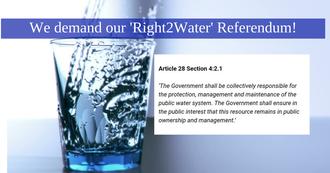





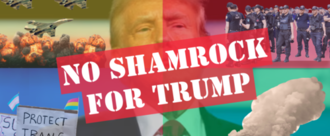.png)
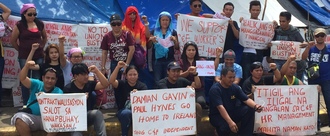
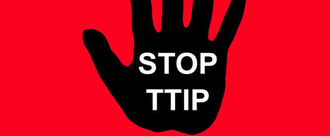
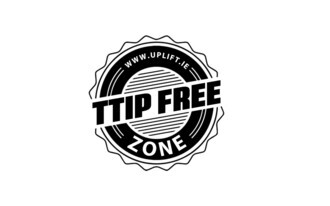.jpg)
